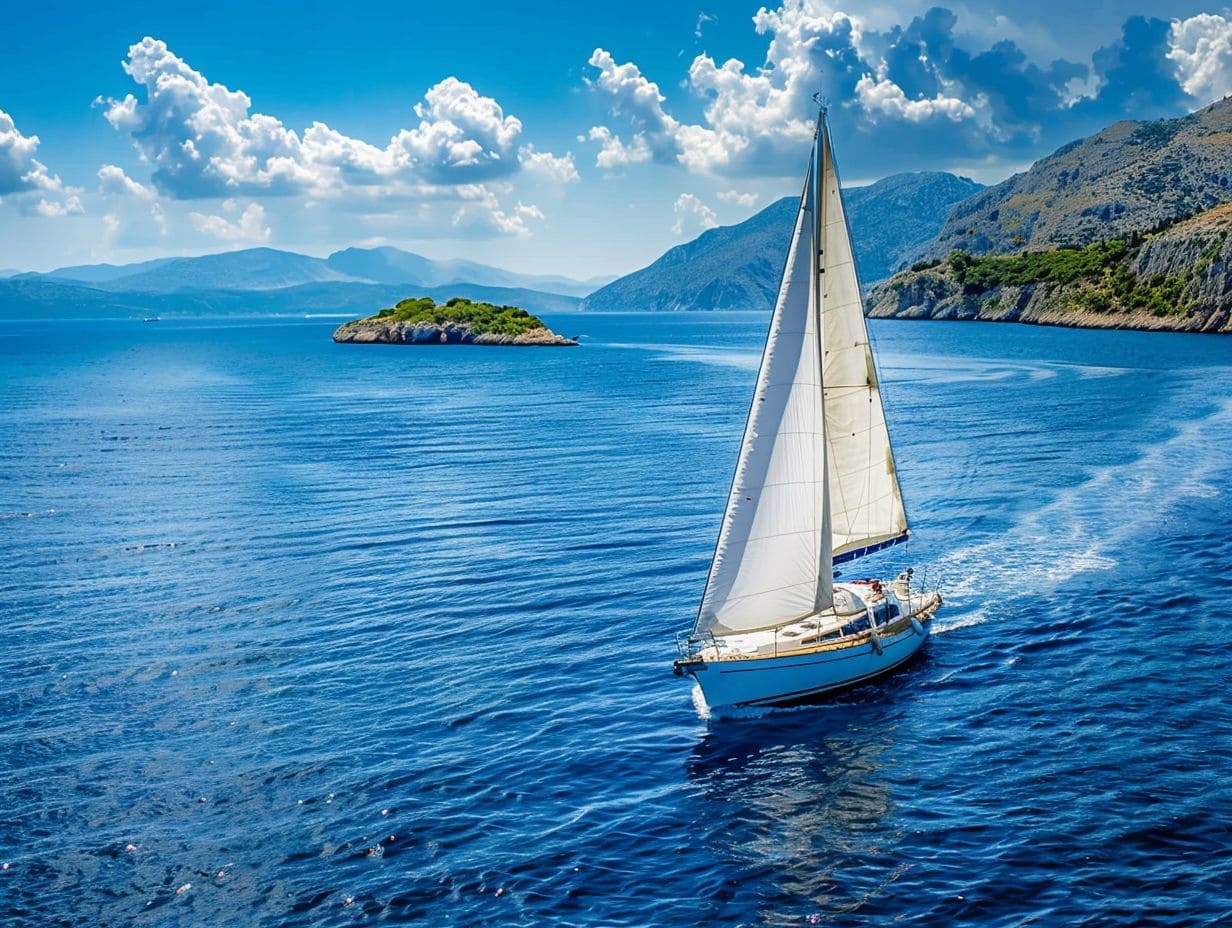Are you dreaming of sailing through the crystal-clear waters of the Greek Islands? Before you set sail, it’s essential to understand the basics of sailing and ensure you have the necessary safety measures in place.
In this article, we’ll provide you with important safety tips for boating in the Greek Islands, including how to navigate safely, prevent common injuries, and deal with propeller issues.
We’ll also cover anchor tips, sun protection advice, and fire prevention techniques to make sure your sailing adventure is smooth and enjoyable.
Key Takeaways:

Understanding the Basics of Sailing in the Greek Islands
When embarking on a sailing expedition in the Greek islands, it is imperative to possess a comprehensive understanding of fundamental sailing principles to ensure a successful journey. Navigation strategies, such as employing wind vane steering and motor boats, are essential components in guaranteeing a seamless and pleasurable passage through the pristine waters of this idyllic region.
Surrounded by the crystalline waters of the Aegean Sea, proficiency in interpreting nautical charts and utilizing compass bearings is paramount for effective navigation. Wind vane steering, a time-honored technique harnessing wind power for steering the vessel, proves to be a valuable skill for maintaining the desired course amidst varying wind patterns. In instances of tranquil seas or when swift mobility is required, the presence of a motor boat on board offers the necessary propulsion and agility for maneuvering through intricate coves and harbors.
Safety Tips for Sailing
Safety is of utmost importance when setting out on a sailing voyage, particularly in unpredictable conditions. It is essential to prepare oneself with fundamental sailing advice and safety equipment, which includes Personal Flotation Devices (PFDs) and other safety gear, to ensure a secure journey, whether for recreational purposes or a corporate yacht charter.
Effective storm readiness is crucial for guaranteeing a smooth sailing experience. It is imperative to stay informed about weather patterns, establish a well-structured emergency strategy, and possess the knowledge of navigating through stormy waters, as these are essential elements in maintaining safety while at sea.
Regardless of whether an individual is cruising along the coastline or engaging in a corporate yacht charter function, the ability to react appropriately in challenging circumstances can greatly impact the outcome. Furthermore, the regular inspection and upkeep of safety equipment, such as life rafts and distress signals, are vital to prepare for unexpected emergencies.
Ensuring Safe Boating Weather Conditions
Emphasizing the importance of prioritizing safe boating weather conditions is paramount for ensuring a successful sailing excursion, particularly when traversing the captivating waters encompassing the Greek islands. Employing precise weather forecasts, navigational proficiency, and essential safety apparatus is imperative in guaranteeing a secure and pleasurable maritime journey.
Vigilantly monitoring updated weather reports enables mariners to preempt and circumvent abrupt shifts in wind currents or inclement weather conditions while navigating the picturesque Greek archipelago. Deciphering navigation data, such as nautical charts and GPS systems, assumes a critical role in selecting optimal sailing pathways that avoid potential risks like submerged rocks or shallow waters. Adhering to safety equipment protocols, encompassing the use of life jackets, distress signals, and fire extinguishers, augments preparedness for any unforeseen emergencies that might arise during the voyage.
Implementing Sailing Safety Measures

It is imperative to establish stringent sailing safety protocols to protect oneself, guests, and the vessel when navigating the pristine waters of the Mediterranean. Properly secure anchors, ensure the presence of all safety equipment, and prioritize the welfare of all individuals on board to facilitate a seamless sailing voyage.
When selecting an anchorage location, it is advisable to opt for an area with robust holding ground to guarantee the anchor’s firm grip. Deploy fenders on the appropriate side of the vessel to mitigate any potential damage during docking. Verify the accessibility of life jackets for all passengers and crew members and acquaint them with emergency procedures and evacuation protocols before departure.
Conduct routine examinations and upkeep of safety gear, including first aid kits, fire extinguishers, and emergency flares. It is crucial to bear in mind that safety should perpetually remain the paramount concern when embarking on a sailing escapade.
Preventing Common Sailing Injuries
Preventing common sailing injuries is of utmost importance to ensure the safety and enjoyment of a maritime voyage, especially in the face of potential challenges posed by storms and adverse weather conditions. It is crucial to prioritize adherence to safety protocols, equip oneself with essential safety gear, and maintain vigilance to effectively mitigate the risks of injuries during sailing.
To preemptively address safety concerns, it is advisable to conduct a thorough inspection of the boat for any potential hazards, secure any loose items on board, and ensure that all passengers are equipped with and wearing life jackets. Moreover, it is essential to acquaint oneself with first aid procedures for treating common sailing injuries, such as cuts, bruises, and seasickness.
When navigating in stormy conditions, it is imperative to closely monitor weather forecasts, take early precautionary measures such as reefing the sails, and, whenever feasible, avoid venturing into open waters. Additionally, having communication devices like a VHF radio or satellite phone on board for emergency situations is critical.
By adopting a proactive and cautious approach, individuals can significantly enhance their preparedness and safety measures, thereby fostering a secure and gratifying sailing experience.
Fire Prevention Techniques on Boats
Fire prevention techniques on boats are crucial to protect the vessel, passengers, and crew during a sailing excursion. The proper maintenance of engines, routine inspections of onboard cabins, and adherence to fire safety protocols are critical elements in preventing fire-related incidents while at sea.
Regular servicing of engines is essential to minimize the likelihood of fires stemming from mechanical malfunctions. Through comprehensive examinations of cabin spaces to identify any potential fire risks, and ensuring that firefighting equipment is both easily accessible and operational, boat owners can significantly bolster safety protocols onboard. The implementation of fire drills and the training of crew members in proper fire response procedures further contribute to a proactive approach when addressing fire emergencies on boats.
Navigation Techniques for Sailing
Proficiency in navigation techniques is of utmost importance to ensure a smooth and pleasurable sailing experience in captivating locations such as the Balearic Islands and Greece. Employing advanced wind vane steering methods, refining navigational skills, and embracing the excitement of exploring diverse maritime landscapes with precision and expertise are essential components.
Wind vane steering applications provide sailors with a dependable means to maintain course direction by utilizing wind power, thereby minimizing the necessity for continual manual adjustments. Traversing the picturesque waters of the Balearic Islands or the intricate shorelines of Greece presents distinctive challenges, including rocky outcrops, strong currents, and varying wind patterns, necessitating strategic navigation.
Proficient navigation not only enhances safety and efficiency but also enables sailors to fully immerse themselves in the beauty and culture of these enchanting sailing destinations.
Anchor Tips for Smooth Sailing

It is imperative to anchor your vessel efficiently to ensure smooth sailing experiences, whether you are navigating the picturesque coastlines with Sunsail or traversing the azure waters while adjusting your sails. To achieve this, it is essential to master anchor techniques, familiarize yourself with reefing procedures, and optimize your anchoring practices for a seamless maritime journey.
Properly setting your anchor entails conducting a thorough assessment of the seabed, determining the appropriate scope for your anchor rode, and securely deploying the anchor before engaging in other sailing activities. When sailing with Sunsail, adherence to their anchoring guidelines in various locations is crucial to uphold safety standards and promote environmental conservation.
Mastery of reefing techniques enables you to adjust your sail area effectively to maintain control and stability in diverse wind conditions. By integrating efficient anchor handling and reefing procedures into your sailing routine, you can significantly enhance your overall sailing experience.
Sun Protection Advice for Long Hours at Sea
When embarking on extended maritime excursions to explore the allure of the Greek islands aboard a lavish yacht, it is imperative to prioritize adequate sun protection for both well-being and comfort.
Adherence to expert sailing guidelines for sun protection, utilization of premium-grade sunscreens, and incorporation of protective clothing are recommended practices to responsibly relish the brilliance of the Mediterranean sun.
In conjunction with comprehensive sunscreen application, it is essential to safeguard one’s eyes with polarized sunglasses and seek shelter during peak sun exposure periods to mitigate risks. Consideration should be given to the utilization of wide-brimmed hats to shield facial and neck regions from the sun’s intense radiation.
Additionally, opting for lightweight, breathable apparel that covers the skin is advisable to minimize susceptibility to sunburn. Regular hydration is crucial to prevent dehydration in the warm sun, and the presence of a fully stocked first aid kit on board is essential for addressing any sun-related emergencies.
Maintaining a focus on personal health and well-being is paramount when engaging in the luxury of sailing through the picturesque Greek islands.
Dealing with Propeller Issues While Sailing
Ensuring the effective resolution of propeller issues holds paramount importance in maintaining the efficiency and safety of motor boats during their navigation through the scenic waters of Greece. Acquire proficiency in troubleshooting techniques, comprehend propeller maintenance procedures, and adeptly manage propulsion challenges to guarantee a smooth and uninterrupted sailing experience.
A fundamental approach to mitigating propeller issues while embarking on sailing endeavors in Greek waters involves conducting regular inspections of the propeller to detect any indications of damage or wear. Familiarizing oneself with common navigation obstacles, such as robust currents or rocky terrains, enables a more cautious and prudent approach to navigation, thus reducing the risk of propeller damage. Adhering to proper propeller maintenance practices, such as ensuring cleanliness and adequate lubrication, serves to significantly prolong the propeller’s longevity and operational efficiency. By maintaining a proactive stance and a comprehensive understanding of propeller care, individuals can relish a worry-free sailing experience amidst the captivating waters of Greece.
Frequently Asked Questions
What are some important safety tips to keep in mind while sailing in the Greek Islands?

It is crucial to always check the weather forecast before setting out on a sailing trip in the Greek Islands. Stay updated on any potential changes in weather conditions and plan accordingly. Also, make sure to have all necessary safety equipment on board, such as life jackets and first aid kits.
How can I ensure a smooth navigation experience while sailing in the Greek Islands?
It is important to familiarize yourself with the local laws and regulations regarding navigation in the Greek Islands. Also, make sure to have a detailed map or nautical chart of the area and mark any potential hazards or obstacles. Using a GPS or other navigation tools can also be helpful.
What should I do in case of an emergency while sailing in the Greek Islands?
If you encounter any emergency situation while sailing, stay calm and assess the situation. If possible, try to contact the local authorities or coast guard for assistance. It is also important to have a designated emergency plan in place before setting sail.
Are there any specific rules or customs to follow while sailing in the Greek Islands?
Yes, there are certain rules and customs that should be respected while sailing in the Greek Islands. For example, it is considered rude to anchor in front of someone else’s property or to disturb marine life by dropping anchor in protected areas. It is also important to dispose of any trash properly and respect the environment.
What are some important things to keep in mind while anchoring in the Greek Islands?
Always make sure to anchor in a safe and suitable location. Check the depth and bottom condition before dropping anchor and make sure there are no underwater cables or pipes. It is also important to have enough space between your boat and others while anchoring.
How can I prepare for potential challenges while sailing in the Greek Islands?
It is important to have a well-maintained and equipped boat to avoid any potential challenges while sailing. Make sure to have spare parts and tools on board in case of any mechanical issues. Additionally, having a backup plan for navigation or communication can be helpful in case of any unexpected situations.


